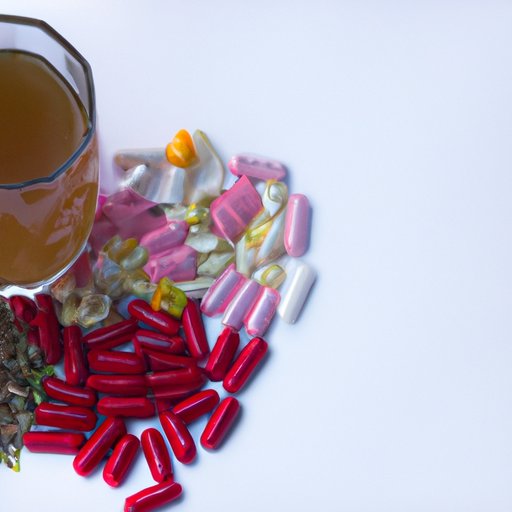
I. Introduction
Gastritis is a medical condition where the lining of the stomach becomes inflamed, leading to symptoms such as indigestion, bloating, and abdominal pain. It can be caused by various factors such as bacterial infections, excessive use of alcohol, and prolonged use of nonsteroidal anti-inflammatory drugs (NSAIDs).
Knowing effective treatments for gastritis is essential to relieve the symptoms and prevent further complications. In this article, we will provide a comprehensive guide to the top 5 effective treatments for gastritis, as well as the role of diet and natural remedies in treating the condition.
II. Top 5 Effective Treatments for Gastritis: A Comprehensive Guide
There are various treatments available to relieve the symptoms of gastritis. Here are the top 5 effective treatments:
1. Antacids
Antacids are medications that neutralize stomach acid, helping to relieve symptoms such as heartburn and indigestion. They are available over-the-counter and commonly contain aluminum, magnesium, or calcium. Antacids are generally safe, but they can cause side effects such as constipation or diarrhea if taken excessively.
2. Proton Pump Inhibitors (PPIs)
PPIs are a group of medications that reduce the amount of acid produced in the stomach. They are effective in treating gastritis caused by acid reflux disease and are often prescribed to prevent complications such as ulcers and bleeding. However, long-term use of PPIs can increase the risk of certain infections and bone fractures.
3. H2 Blockers
H2 blockers are a type of medication that reduces the amount of acid produced in the stomach. They are commonly used to relieve symptoms such as heartburn and indigestion. H2 blockers can cause side effects such as headache and diarrhea, and they may interact with other medications.
4. Antibiotics
Antibiotics are medications prescribed to treat bacterial infections that may be causing gastritis. They are usually given in combination with other medications and are effective in treating gastritis caused by certain bacteria such as Helicobacter pylori. However, antibiotics can cause side effects such as nausea and diarrhea.
5. Cytoprotective Agents
Cytoprotective agents are medications that help protect the lining of the stomach from damage. They are often prescribed to treat gastritis caused by NSAIDs. Cytoprotective agents can cause side effects such as headache and dizziness, and they may interact with other medications.
The dosage, duration, and side effects of each treatment may vary depending on the severity of the condition and the underlying cause of gastritis. It is important to follow the instructions of your doctor or pharmacist when taking any medication.
III. Natural Remedies vs Medications: Which is the Best Treatment for Gastritis?
In addition to medications, natural remedies are often used to treat gastritis. Some of the popular natural remedies include:
- Probiotics
- Ginger
- Chamomile tea
- Turmeric
- Honey
While natural remedies may provide relief for some people, they are not backed by extensive scientific research and may not be effective in treating all cases of gastritis. Medications such as antacids and PPIs have been proven to be effective in relieving symptoms and treating gastritis caused by acid reflux disease. Antibiotics are necessary to treat gastritis caused by bacterial infections such as Helicobacter pylori. Cytoprotective agents are effective in treating gastritis caused by NSAIDs.
It is important to consult a doctor before trying any natural remedies for gastritis, as they may interact with other medications and cause side effects.
IV. A Doctor’s Perspective: Understanding the Best Treatment Options for Gastritis
When diagnosing gastritis, doctors may perform a physical exam, review medical history, or conduct a blood test or stool test to identify the underlying cause. Based on the severity and underlying cause of gastritis, a doctor may recommend one or a combination of the following treatments:
- Antacids
- PPIs
- H2 blockers
- Antibiotics
- Cytoprotective agents
It is important to follow the doctor’s instructions regarding dosage, duration, and possible side effects of each medication. In addition, a doctor may recommend lifestyle changes such as avoiding triggers, reducing stress, and maintaining a healthy diet to prevent further complications.
V. The Role of Diet in Treating Gastritis: Tips and Recommendations
Diet plays an important role in treating gastritis and preventing further complications. Here are some tips on how to maintain a healthy diet:
- Avoid foods that can irritate the stomach, such as spicy foods, greasy foods, alcohol, and caffeine
- Eat smaller, more frequent meals to avoid overloading the stomach
- Incorporate foods that can help soothe the stomach, such as bananas, rice, apple sauce, and toast
- Stay hydrated by drinking plenty of water and avoiding carbonated beverages
It is important to consult a doctor or dietitian for personalized recommendations based on your specific situation.
VI. Comparing Traditional and Modern Treatments for Gastritis: Pros and Cons
In addition to modern treatments such as medications, traditional treatments are often used to treat gastritis. Traditional treatments may include herbal remedies, acupuncture, or Ayurvedic medicine.
Modern treatments such as medications are backed by extensive scientific research and have been proven to be effective in treating gastritis. However, they may cause side effects and may not be suitable for all individuals.
Traditional treatments may provide relief for some people, but they are not backed by extensive scientific research and may not be effective in treating all cases of gastritis.
VII. Conclusion
Gastritis is a medical condition that can cause discomfort and lead to further complications if left untreated. The best treatment options for gastritis include medications such as antacids, PPIs, H2 blockers, antibiotics, and cytoprotective agents. In addition, natural remedies and lifestyle changes such as maintaining a healthy diet can help relieve symptoms and prevent further complications.
It is important to consult a doctor for proper diagnosis and treatment of gastritis. Follow the doctor’s instructions regarding medication dosage and possible side effects. With proper treatment and a healthy lifestyle, gastritis can be effectively managed.




